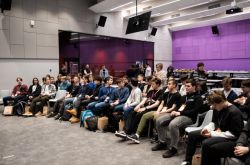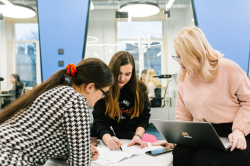Artemy Blinov
Came to ITMO to participate in ICPC, the world’s largest collegiate programming competition

Artemy Blinov. Photo by Dmitry Grigoryev / ITMO NEWS
Path to student competitions
I was born in Kansk, a small town near Krasnoyarsk. In seventh grade, I developed an interest in math and computer science – first, I attended online courses by the Sirius educational center and tried my hand at problems, but gradually I got into competitions. I particularly remember the semi-finals of the Russian national team competition for school students in computer science. We didn’t win, but I met a lot of people interested in the same things; it was the first time that I had to tackle competition-level tasks. That was when I decided to keep competing.
My first successes came in ninth grade, when I became a runner-up in the regional stage of Vseros in math and a winner in the regional stage of Vseros in computer science and the Belchonok competition in computer science. Starting from tenth grade, I started training more professionally and solving problems from Codeforces and Programmer School (a platform with problems and contests for school students – Ed.). I also found a mentor, Vitaly Demidenko, and joined a programming club at another school. Later, I also trained under Nikolay Laletin, who was one of the organizers of the regional stage of Vseros in computer science.
Read also:
Training approach and successes
Many of my friends were quite advanced in programming and I wanted to be better than them – this element of competition always motivates me. It was easy for me to combine training for competitions with regular school work because I was allowed to solve competition problems instead of attending computer science classes. Apart from my mentors, my mom also really helped me: for instance, she found courses by Yandex or T-Bank for me. I spent a lot of time online looking up lecture notes and problems, which I love to solve them.
In tenth grade, I gave my all to competitive programming and it paid off: I became a runner-up in the Siberian competition for school students and the competition organized by Ural Federal University; I also won Belchonok, Vyshaya Proba, and the Technocup competitions. That year was also my first time at the final stage of Vseros; as a participant, I was invited to a summer camp in competitive programming at Sirius. There, we had three weeks of classes – an hour or two of lectures, followed by daily five-hour, ICPC-style contests. It was a valuable experience that helped me become a runner-up at Vseros. In my final year at school, I continued training at a more relaxed pace, but nevertheless I became a runner-up at Vseros again and even improved my performance: the first time, I scored 422 points, and the second – 544 out of 800.
Choosing a university
Thanks to my performance at Vseros, I could enter any university without exams, but I didn’t have to choose for long. In tenth grade, I got into the finals of the national team competition in computer science and we were given a tour of ITMO University. I had the chance to see the university from the inside; I also learned that former ICPC winners and runners-up work here, including Andrey Stankevich, Mikhail Mirzayanov, and, of course, the legendary Gennady Korotkevich.
ITMO’s competitive programming reputation stretches far beyond St. Petersburg, and I wanted to keep competing while getting a good education. Moreover, I talked to former students of my school who were ITMO students and all of them told me: “It’s hard, but it’s worth it.” So, it was an obvious choice.
Many competition winners choose the tried-and-true program Computer Technologies, but I opted for AI360: ML Native, which trains AI developers and researchers. I am inspired by neural networks. I was stunned that developers at OpenAI could create something as complex as ChatGPT and I wanted to make something similar myself.
Read also:
First-Ever Bachelor’s Program for AI Developers Launching in Russia
Opportunities at ITMO
I expected that our studies would be centered on competitive programming subjects – and that turned out to be true. My current courses are Discrete Mathematics by Andrey Stankevich and Algorithms and Data Structures by Daniil Oreshnikov. There is even a separate course on competitive programming and ICPC, led by Mikhail Perveev, an ITMO graduate and a gold medalist at ICPC Northern Eurasia Finals 2023. I already have a team of my own. The staff of the Information Technologies and Programming Faculty Konstantin Bats, Nikolay Vedernikov, and Georgy Korneev organize competitions for us and other teams; we also regularly solve Codeforces contests. My dream is to go to the ICPC finals. I want to try myself at something so grand. It’s like the next level of Vseros – even harder and more prestigious.
Andrey Kuzivanov
Plans to be a senior developer and open an online school in competitive programming

Andrey Kuzivanov. Photo by Dmitry Grigoryev / ITMO NEWS
Path to student competitions
I studied at one of the best schools in Yekaterinburg. When I was in seventh grade, the school launched a separate course on competitive programming. I took the test, passed the selection, and got into the advanced programming course.
In the first few years, I learned the basics – I enjoyed diving deep into the topics that weren’t on the curriculum and taking my time solving problems. I also often went to a summer camp in competitive programming, where I met other students; later, we would attend camps and competitions together. This community became crucial for me: apart from programming, I loved spending time with my friends.
Training approach and successes
In tenth grade, I started focusing more on programming, proceeding from the basics to more complex topics. That year, I came to the regional stage of Vseros, but couldn’t get into the national finals: I had 508 points, but the threshold was 511. I didn’t despair; I understood that I wasn’t ready for the finals just yet. One feature of the competition is that they don’t test your knowledge in a specific field; instead, the problems are meant to test your ingenuity, like using a well-known algorithm in a new way. You can build this skill only by regular practice, so I kept competing and growing my experience.
As a runner-up of the international competition in computer science by Innopolis, a winner and runner-up at Vyshaya Proba, and a runner-up at the competition by Ural Federal University, I knew my place at a good university was secured. By eleventh grade, I was doing programming because I enjoyed the process. However, I still decided to take part in the Ural Federal University competition (which I won), and finally became a runner-up at Vseros, scoring 539 points.
Choosing a university
Those in competitive programming have an awareness of particular universities that are considered a good choice. ITMO is one of them. I’d been hearing the names of well-known ITMO lecturers since school: Andrey Stankevich taught classes at my summer camp while Mikhail Perveev organized an online competitive programming club when I was in tenth grade. I enjoyed their approach back then – and now (spoiler alert) I attend their lectures at ITMO.
Read also:
ITMO.EduStars Winner and ICPC Star Coach Andrey Stankevich on Finding His Calling
Opportunities at ITMO
I am in my first year of the Computer Technologies program. I chose it because it best fit my interests. Competitive programming does develop your thinking skills, but it’s still a rather narrow field without direct real-life applications. At my program, we learn about the kind of programming that can help your career. It’s great that our lecturers know truly challenging tasks and we, as competitive programmers, enjoy solving them. We already have a community of students with similar interests and experience: we get together to solve problems.
In the future, I’d like to become a senior developer at a major company and to try teaching competitive programming. In eleventh grade, I already taught a class in the subject at school, and I am thinking I can tutor or even start my own online school in the future.
I think it won’t be hard to land an internship in my third year. My program has great industrial partners, including Yandex, T-Bank, and VK. They often host lectures with developers or career guidance meetups, where we learn about employment opportunities. For instance, at the latest meetup, T-Bank developers talked about the available internship positions.
Mikhail Tuzov
Dreams of working at a top IT company and sharing his experience with students

Photo by Dmitry Grigoryev / ITMO NEWS
Path to student competitions
I got into programming in seventh grade while studying at a lyceum in Arkhangelsk. It was then that I started attending a C++ club and later joined the competitive programming club at Northern (Arctic) Federal University upon recommendation from my teacher.
Training approach and successes
After ninth grade, I landed a place at the Computer Summer School, which is a two-week summer camp in competitive programming. There, I truly boosted my skills and learned about new algorithms and data structures. I also took note of a few ideas that truly helped me at competitions. Thanks to this experience, I became a runner-up of the International Open Competition in Computer Science and Mathematics organized by ITMO.
In tenth grade, I came to the Vseros finals as the student with the highest score in Arkhangelsk Oblast; no one had passed over the threshold score, so I was invited to represent the region. I scored 436/800 points, placing 97th and becoming a runner-up. Curiously, there have been only three Vseros runners-up in computer science from Arkhangelsk and the second one of them, who competed a few years earlier than me, also took 97th place.
Choosing a university
Until ninth grade, I didn’t know anything about ITMO, but after the summer school, I only considered this university for my future studies. At the school, I met Andrey Stankevich. Even though he didn’t train me personally, he worked with other teams, spoke at events, made jokes – he was the most charismatic person at the school. I even remembered one of his jokes about switching from Windows to Linux: “To launch Linux, restart your computer. When it starts, you’ll have three seconds to press the right key. Pay attention: three seconds is not much, not little. Don’t miss this window.”
Moreover, I became interested in AI360: ML Native, the program on neural networks that’s supported by Sberbank and Yandex. I think that in the future neural networks may replace programmers, so I’d better master the field – so as not to lose my opportunities. As they say, if you can’t beat them, lead them.
Opportunities at ITMO
At ITMO, I don’t have to worry about money or look for a job alongside my studies. As a student of AI360: ML Native, I have a 40,000-ruble scholarship; as a Vseros runner-up, I receive a 25,000-ruble stipend from ITMO and a 6,000-ruble stipend from the Government of St. Petersburg. I think that my experience is a vivid example of how student competitions can not only be your ticket to the best universities, but also quite a paycheck.
I am fully focused on my studies: we have many classes on linear algebra (which will be handy in machine learning) and many hours of Python programming under the guidance of a lecturer from Yandex’s Data Analysis School. In the future, I’d like to grow in the field of industrial programming and AI – for instance, develop ML models. I could also see myself teaching at the university alongside this job in order to share my experience with the next generation.





